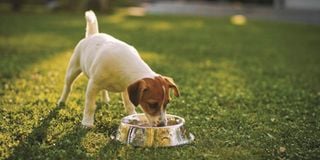Premium
Here’s how to tell if your puppy is dehydrated

Dogs lose the majority of body water during urination.
Dogs lose water daily when breathing and panting through evaporated saliva. Although this can easily lead to dehydration, it is rarely a cause of alarm. Puppies are more susceptible to dehydration compared to adult dogs because they have less body mass.
Dogs lose the majority of body water during urination hence why their water bowls should be constantly replenished frequently. Concentrated puppy urine, with a strong pungent smell is one of the signs that your dog is not taking enough liquids. Puppies drink more water during hot days compared to rainy days but make sure they have water even on cold days.
Dehydration also occurs when the puppy has an illness that results in diarrhoea or vomiting. One of the earliest signs to watch out for to tell if your puppy could be dehydrated is when the puppy’s gums and tongue become sticky and you notice the saliva is sticky and stringy.
Elasticity test
You can also do the skin elasticity test. You do this by gently pulling the skin on the dog’s shoulders or neck. When hydrated, the skin will spring back into place when you release the grasp. If the puppy is dehydrated, the skin retracts very slowly and or may not spring back at all in case of severe dehydration. When you notice this, call your vet.
Another measure of dehydration is pressing your finger on the puppy's gum. If the puppy has enough liquids in the body, the pressed area turns white and quickly returns to the pink pigment when you release the pressure. If they are dehydrated, the refill time of the pink colour takes a while. You might also see the puppy’s muscles twitching, they could have sunken eyeballs.
Fluid therapy
Mild cases of dehydration are treated by letting your dog drink a lot of water. If they are vomiting or have diarrhoea, the vet will give them medication to treat the underlying illness and prevent further liquid loss. The puppy may also need fluid therapy which is rehydrating the puppy to return their minerals or electrolytes to normal.
Older dogs lose water from excessive urination caused by illnesses such as diabetes or kidney disease. Conditions that led to the dog not eating or reluctance to drink anything can cause dehydration. So in case you see the dehydration signs on an old dog, visit the vet to determine what could be ailing them.
Maryanne is a pet owner. [email protected]





